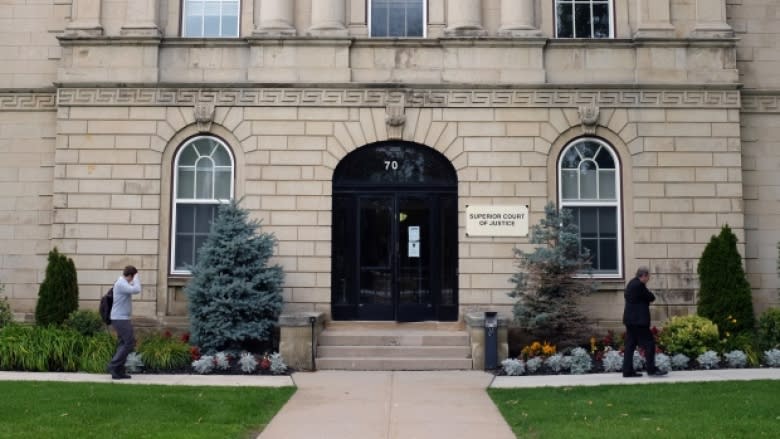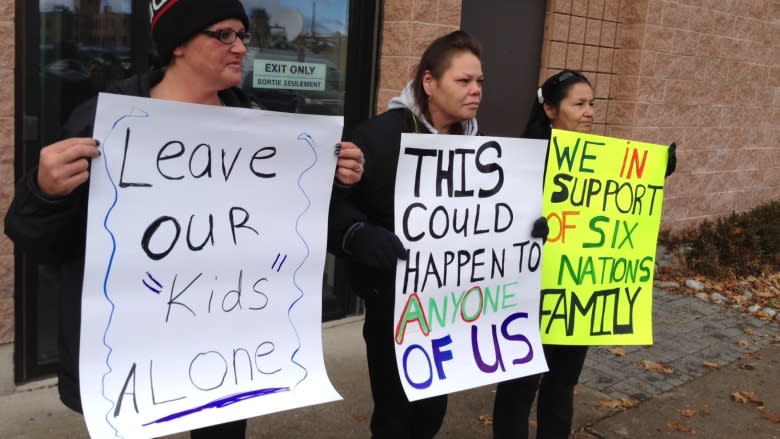'Stress' over chemo court fight 'uncalled for': family of aboriginal girl
The family of an aboriginal girl who was at the centre of a court case about whether she should be removed from her family and given chemotherapy says the stress of the case was "uncalled for" and that they would never compromise the child's well-being.
A judge rejected an application from a Hamilton hospital that would have seen the Children’s Aid Society intervene in the case of the girl whose family had stopped her chemotherapy at the hospital in favour of traditional medicine. The girl has been undergoing treatment for leukemia in Florida.
In a statement posted on a Six Nations community newspaper Friday night, the family of the girl at the centre of the case says the "stress our family lived until today was uncalled for" and that they would never compromise the child's well-being, saying plans that included monitoring blood work was part of a care plan.
Judge Gethin Edward has presided over the complicated and potentially precedent-setting Brantford, Ont., court case since it began on Sept. 25.
"I cannot find that J.J. is a child in need of protection when hersubstitute decision-maker has chosen to exercise her constitutionally protected right to pursue their traditional medicine over the Applicant's stated course of treatment of chemotherapy," Edward said, as he read his ruling aloud.
Edward, citing the testimony of two McMaster Children’s Hospital doctors, agreed the child wasn't capable of making her own medical decisions. But he found it was the mother’s aboriginal rights — which he called "integral" to the family’s way of life — allow her to choose traditional medicine for her daughter.
"In applying the foregoing reasons to the Applicant's section 40(4) application, I cannot find that J.J. is a child in need of protection when her substitute decision-maker has chosen to exercise her constitutionally protected right to pursue their traditional medicine over the Applicant's stated course of treatment of chemotherapy."
"The application is dismissed. This is not an appropriate case to consider cost."
"I wish to thank all counsel for their efforts in this very difficult case."
— Judge Gethin Edward
Hamilton Health Sciences doctors asked for the Children’s Aid Society to separate the girl from her family so she could resume chemotherapy. The girl’s doctors said she has a 90-95 per cent chance of survival on chemotherapy, but that they didn’t know of anyone who had survived Acute Lyphoblastic Leukemia (ALL) without the treatment.
Neither the girl nor her mother can be identified due to a publication ban.
The decision was met with applause from many in the courtroom, including members of the girl's family.
"It is dismissed. It is dismissed … aboriginal rights are upheld," said a family friend, in tears, as she called the girl's mother from inside the courtroom.
The statement posted online Friday said the child "has blood that proves amazing responsiveness to the treatment we are using. We are happy with the results and will continue to monitor her."
Hospital has no plans to appeal
Lawyers representing Hamilton Health Sciences, as well as the doctors who treated the girl, left quietly after the verdict.
McMaster Children's Hospital issued a statement late Friday afternoon, calling the court case "a difficult circumstance for everyone involved."
"Our motivation has always been and remains that this child receives life-saving medical treatment in a timely manner," the statement reads.
"We have always supported this family's decision to use traditional aboriginal healing practices in conjunction with conventional medical treatment."
Hospital president Dr. Peter Fitzgerald told the Canadian Press that the hospital had no immediate plans for an appeal.
Fitzgerald had previously warned that the girl would die if she did not receive chemotherapy.
'This is monumental'
Outside the court, Six Nations Chief Ava Hill and New Credit First Nations Chief Bryan Laforme welcomed the ruling, saying it has broader effects across Canada.
"This is monumental," said Laforme. "It reaffirms our right to be Indian and to practise our medicines in the traditional way."
Hill said the mother is "overjoyed," with the news.
When asked about what specific treatment the girl is receiving now, Hill declined to say, adding that was between the family and the girl's traditional healer — which Hill said involves the same confidentiality of a doctor-patient relationship.
The mother, Hill said, "has the right to do whatever she wants to try and save her child."
Officials from the Brant County Children's Aid Society also welcomed Edward's ruling, saying it prevents the "trauma" of taking the girl away from her family while she was being treated.
Brant CAS executive director Andrew Koster said his organization's argument wasn't based on the relative merits of medical treatments, but on the fact that the case involved a loving mother who would have been separated from her daughter.
"This was going to be two years of chemo. Does that mean we were going to take this child away for two years? And suppose she didn't make it?" Koster said.
"I truly did not believe that we should be taking her into care," he said.
Family has 'difficult decisions' to make
Mark Handelman, the lawyer representing the Children's Aid Society, said this case should remind those involved in future medical cases that patients' values and traditions should always be considered.
"In treatment decisions, the values and beliefs and wishes have a clear place."
Handelman, an expert in bioethics, said the family hasn't completely ruled out chemotherapy if it becomes necessary.
"They have difficult decisions to make, and one can only hope that the right decisions are made."
Judge Edward reiterated that no one, including the doctors from McMaster Children’s Hospital who have called for legal intervention, has suggested that the girl's mother is negligent.
"Nobody is suggesting DH is anything but a caring, loving parent," he said in his ruling.
The girl and her family have not been present in court throughout the proceedings. Neither the patient nor her family can be identified because of a publication ban in the court case.
The girl’s mother has defended her decision to seek alternative cancer treatment at the Hippocrates Health Institute in Florida, a centre that focuses on nutrition and naturopathic therapy.
In a letter to CBC News, she wrote, "I will not have my daughter treated with poison … I have chosen treatment that will not compromise her well-being and quality of life."
The family paid the institute $18,000 for the treatment. In a video obtained by CBC News, institute director Brian Clement says his institute teaches people to "heal themselves" from cancer by eating raw, organic vegetables and having a positive attitude.
"We've had more people reverse cancer than any institute in the history of health care," he says.




